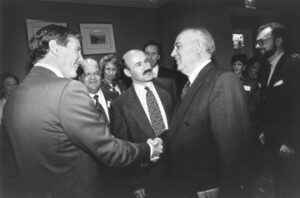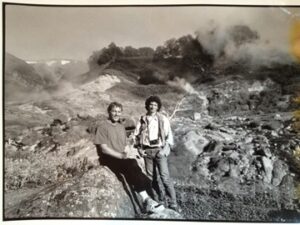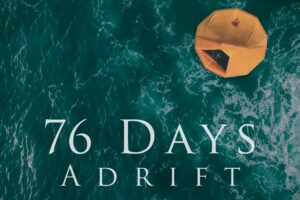
The American Meteorological Society, composed of the 13,000 weather men and women who deliver our daily weather predictions, has picked its book of the year: Fire and Flood by Eugene Linden, the Irvington-based author of some 11 works of non-fiction and many articles for Time magazine, the New York Times and multiple other outlets. “And I’m as pleased as punch,” Linden says. “This is exactly the audience I most appreciate endorsing the book.”
Linden’s satisfaction hinges especially on the fact that it’s from our weather folk that most of us receive our knowledge about the climate. Perhaps through them, the public will take on a greater awareness of the climate crisis and its current and future impacts.
Linden is confounded by our failure to act on climate change, his topic in Fire and Flood and something he’s been writing about for decades. “We just aren’t serious about tackling the threat. The facts are damning. 35 years after they became a major issue, global emissions are more than 60% higher. Instead of action, I’ve seen an unbroken continuum of gaming, greenwashing, blame shifting, deflection, denial, broken promises, toothless international agreements, and bureaucratic maneuvering,” he said.
Linden, a man who obviously doesn’t pull his punches, has spent a lifetime writing about what sets the human race apart from the animal kingdom, and how we came to rule the planet. “I had an epiphany at college, about the consumer society. That led to my third book, Affluence and Discontent, which is at the heart of all my thinking.”
Born in Vermont, raised in Bronxville, a student of English Literature at Yale, Linden burst into the world of journalism with his first article, The Demoralization of an Army, about fragging during the Vietnam War, published in the Saturday Review in 1972. Publishers subsequently invited him to write a book, and the result was Apes, Man and Language, the first of several texts on animal intelligence.

Meanwhile, the journalism continued, including a stint at Time where he could he write about topics of his own choosing, such as the burning Amazon rainforests, the loss of indigenous knowledge, and a corner of the Congo, in Africa, he dubbed “the world’s last Eden”.
The Future in Plain Sight: Nine Clues to the Coming Chaos, published in 1998, proved to be scarily prescient in its predictions of coming instability. “Twenty years later, many of the destabilizing factors had come to be, including, a few years later, a pandemic.”
And overlapping with his literary career, Linden also spent 15 years as chief investment strategist for a hedge fund, work which supplied a financial-insight edge to his environmental writing. In Fire and Flood, for example, Linden analyzes the response of the insurance industry to climate crisis risk, now a very big deal as states like Florida become uninsurable.
So, is he hopeful about saving the planet? “It’s hard to be optimistic. We seem to be going backwards in every conceivable way. Yes, there are stirrings, but the consumer society is blind to long-term threats. Plus, environmental questions began to be politicized in the 1990s. Facts no longer matter. Politics are our biggest problem.”
 Yet he is not gloomy. He’s still busy writing: essays, op-eds, and a sequel to his first novel. And he loves his home in Irvington – “I love it here; I don’t love the taxes” – and kayaking on the Hudson. What then, might be his comment on the River Towns and the environment? “If you want to think about climate change,” he advises darkly, “think about Sandy.”
Yet he is not gloomy. He’s still busy writing: essays, op-eds, and a sequel to his first novel. And he loves his home in Irvington – “I love it here; I don’t love the taxes” – and kayaking on the Hudson. What then, might be his comment on the River Towns and the environment? “If you want to think about climate change,” he advises darkly, “think about Sandy.”






